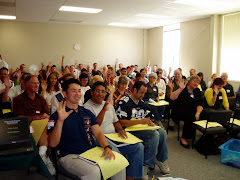Look for the silver lining inside every dark cloud, always look on the bright side, find something positive in every bad situation or say to yourself "...there are less fortunate people on the planet than me" and finally - "...always look on the bright side of life!"
to yourself "...there are less fortunate people on the planet than me" and finally - "...always look on the bright side of life!"
 to yourself "...there are less fortunate people on the planet than me" and finally - "...always look on the bright side of life!"
to yourself "...there are less fortunate people on the planet than me" and finally - "...always look on the bright side of life!"I'm sure you've heard these statements or similar, once or twice before. Said by people who are promoting the importance of looking on the brighter side of life, when the chips are done or when life turns to custard. Some of us also know it by the question "Is the glass half full or half empty? (depends if your thirsty or not!) For those of us on the street we'd know the attitude in these examples as having a positive or negative attitude. For those involved in personality typing they're likely to call it optimism or pessimism. Either way it's all about how you interpret a situation you are faced with throughout your day.
I think there's plenty that's been said about optimism. You can read Dr. Martin Seligman's book called Learned Optimism and his other writings on the subject and optimism's well documented relationship with benefits for both our mental and physical wellness.
So... that's not what this article is about.
Entrenched Pessimissim
What I think that's needed (critical) is a more detailed understanding of how pessimism is so firmly entrenched in the very fabric of our being, that we do not recognise what we do and say, and is in fact, a constant pessimistic approach people have in general to the situations we face on a daily basis.
We can be so blinded by how we respond, to the point that we do not link our responses to having a pessimistic undertone. Usually because the mindset of pessimism is blended with other frames of mind like caring, protectiveness, achievement, love, clarity, trustworthiness etc.. and it is these frames that we are more conscious of and not the over arching driving frame of pessimism.
Let me explain by giving you 3 examples:
- Your staff call while you are out of the office. You recognise the caller ID. You answer the phone by saying "Hi. What's wrong?" (You care about your business and the staff and assume that something is wrong when there has been no reference to there being a problem)
- You have an upcoming exam that is very important for your advancement. You say to a friend " I'm so very nervous, I want to pass but it's going to be a tough exam." (You want to be successful in the upcoming exam yet frame the exam as being "tough")
- You want to go fishing with the kids in the morning. You say to the kids "It had better be fine tomorrow or it'll be just terrible!" (You want the fishing trip to be a success and the kids to enjoy the day and predict that it will be terrible if the weather is not fine)
Hidden within each of these statements you'll find the fragments of a pessimistic attitude. This is all too common when you set your mind to listen for it. At times it may even appear on the surface to be an optimistic approach, but it is not. Have another read over the statements above. Some are more obvious than others - are they not?
Pessimism, as I am defining it, is found in more than the balatant and typical situations of whether something is either good or bad, easy or hard, or whether you can or can't do something. It permeates other responses like:
- Regularly fault finding in what others say & do
- Negatively escalating a situation (Mountain out of a mole-hill stuff)
- Creating worst case scenarios that you are convinced are real
- Being suspicious of other people, unnecessarily
- Being fearful of situations that you've not experienced before
- Creating future situations that have negative outcomes
- Being overly protective of another person or project
- Doubting what others say to you
- Finding the exception to a situation that is positive or hopeful
- Responding with an opposite response to the point of view being offered
The list I've made is not comprehensive. It's not meant to be. I hope that it gives you an idea of how to recognise a pessimistic response when you next make one or hear one from others.
I'm not saying that a person who positively explores a worst case scenario is being pessimistic. What I am saying is, it is a common pattern of response that you make when presented with a situation. Do you default to a worst case scenario and then escalate it too an even worse case scenario etc...?
Know It & Eliminate It
What I'm wanting you to do, is be more aware of how you respond.
- Do you think of people as being untrustworthy, unreliable?
- Do you think of people as being put to get you or see the worst in people?
- Do you jump to conclusions about people that are actually unfounded but certain in your own mind.
- Do you see the worst in people?
- Do you find that you start more arguments with others, than they do with you?
- Do you doubt what people say more often than not?
- Do you feel insecure and inadequate?
Reading over these bulleted points, it could be easy for some readers to say "Hey, that's not a pessimistic attitude you've described there!" And, that is what I am talking about.
When I listen to a client while I am in coaching or training I often hear, what at first glance, appears not to be a pessimistic attitude. BUT - in my opinion, pessimism is found to be the over-arching theme that is present in what they are saying. Yes, they may say it's more about being safe, sensitive to who you can or can not trust and about not being gullible and getting sucked in by others etc... However - it is still NOT about having an optimistic view of the world and those around us!
I'm not saying that evaluating worst case scenarios is being pessimistic, quite the contrary. Positively analyse worst case scenario's and come up with solutions to them and implement them to mitigate the risks. That's an excellent approach. Burying yourself in worst case scenario's and escalating them to the tenth-degree as a negative, and in my mind, is not acceptable o ptimistic view.
ptimistic view.
 ptimistic view.
ptimistic view. There are plenty of reasons why we need to be aware of how our pessimistic attitude oozes out in all we do. From whether we can arrive at the office on time while being stuck in traffic or whether the person you love is telling the truth to you or not. Whether the fare the taxi driver is charging you is reasonable or the reason why your staff have not completed their time sheets on time is true. We are faced with situations daily and we have the choice whether we interpret each and every situation as being a positive or a negative.
How do you interpret frequent situations you are faced with? Even better, how do you interpret rare and infrequent situations? Do you implode or explode, as a direct result of what has happened? Do you find the possibility immediately or the impossibility?
A Lesson Worth Learning
This has to be one of life's simplest lessons. That you have 1 of 2 choices when faced with all situations. You have the choice when you listen, see and observe a situation to interpret it optimistically or pessimistically. You can always choose to find the good in what was said or the bad in what was said to you. In my opinion, no matter how you try to justify your negative attitude, it is still a negative attitude and therefore a pessimistic one.

Listen to how you respond - could you have chosen a more optimistic view at the time, no matter how bad it may have 1st appeared? Pessimism is more prevalent on our planet than optimism, is what I have found to be true. It seems to me that it is always easier to be pessimistic than it is to be optimistic about life's challenges. I'm not exactly sure why - perhaps it's the human condition at play, I'm not sure.
What I am sure about is, that we need to be more aware of how pessimism has seeped into our lives hidden in responses that we justify as being anything else other than - pessimism. Perhaps it's done to hold tentatively onto what we may think is an optimistic attitude, not comfortable to admit that we are in fact, more often pessimistic than we are optimistic!

















































No comments:
Post a Comment